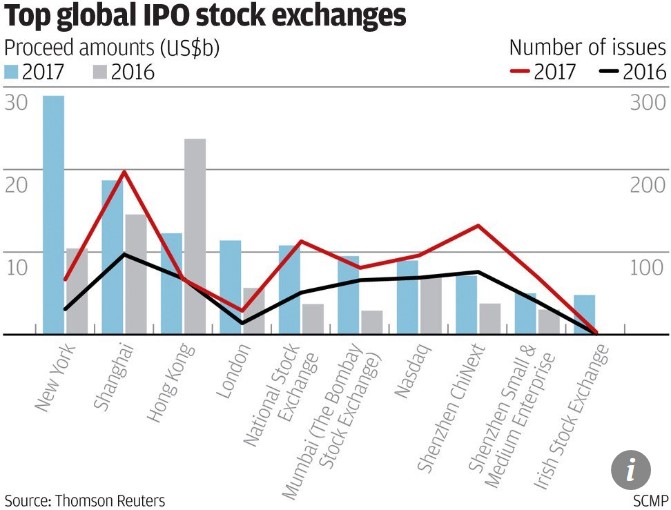The Chinese IPO space has really been perking up, with 137 Chinese companies going public in 2017 and raising a collective $32.2 billion, according to Renaissance Capital. The NYSE, Nasdaq and the Hong Kong Stock Exchange (HKSE) have been competing for a piece of the Chinese action with 16 companies listing in the U.S. last year.
Several mega-funded Chinese tech unicorns--including Tencent Music and the YouTube of China, iQiYi--have been angling to go public this year, but may be forced to reconsider their timing (or destination) after smartphone maker Xiaomi’s disappointing IPO and ensuing drama.
Xiaomi shares closed about six percent lower Monday in Hong Kong in their first day of trading that gave them a valuation of $54 billion—far below the $100 billion that the firm was looking for.
That was in sharp contrast to the erstwhile trend of China’s investors oversubscribing especially for new economy technology stocks.
Case in point is gaming hardware company Razer and online healthcare provider Ping An Good Doctor whose shares were oversubscribed several hundred times. Clearly, investors’ fervor has waned.
Xiaomi shares subsequently recovered over the next few days after the company that owns the Hang Seng Index agreed to include them in its index. But the drama was yet to fully unfold.
The shares have been selling off once again, being hammered to the tune of 10 percent at one point on Monday trading, as the company found itself embroiled in a nasty turf war after mainland bourses blocked Chinese investors from trading them in the Stock Connect pool. Related: Is This The Answer To High Gasoline Prices?
The Shanghai and Shenzhen exchanges have unexpectedly stopped accepting Xiaomi in the Stock Connect program. This in effect means that mainland Chinese investors will be unable to buy or sell the Hong Kong-listed shares under the cross-boundary investment channel.

(Click to enlarge)
Source: South China Morning Post
Trade Wars Taking Their Toll
Beijing’s surprise move to bar access to offshore tech darlings is meant to prevent capital flight as the local stock markets start feeling the heat from the escalating trade wars with the U.S.
At the heart of the matter is the inclusion of companies with multiple classes of stocks or weighted voting rights (WVRs) among Hang Seng’s 484 members.
Xiaomi had initially intended to list part of its shares on the mainland bourse via China depository receipts (CDRs) but later changed its plans. That was seen as the biggest reason why the company received a much lower valuation.
The muted start to public life could not have come at a worse time.
Related: UK Stocks Bounce Back From Worst Selloff In Years
China’s growth story has started developing cracks with GDP growing 6.7 percent in the April-June quarter down from 6.8 percent the previous one. That could get progressively worse after Washington slapped additional tariffs on China’s imports on Tuesday.
Dennis Ng Wang-pun, president of the Chinese Manufacturers’ Association, has expressed concern that the second round of tariffs would drive U.S. importers of Chinese goods to other less expensive markets, leading to loss of crucial business. As he duly noted, many of the products that come out of China are not unique and could be sourced from other countries.
Windfall for U.S. Exchanges?
But maybe that will work in the favor of U.S. exchanges.
On Sunday, Tencent Holdings announced that it plans to list its music arm, Tencent Music Entertainment Group, in an unspecified U.S. exchange. At the risk of being accused of schadenfreude, U.S. exchanges will definitely be pleased with the current state of affairs and could see an influx of more IPOs coming from China.
By Alex Kimani for Safehaven.com
More Top Reads From Safehaven.com:
















